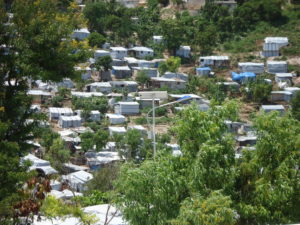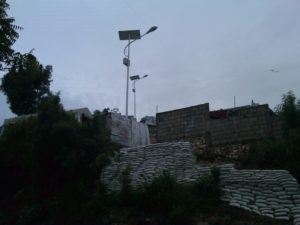The American Red Cross is installing solar lamps in makeshift camps in an effort to improve the safety of vulnerable Haitians, particularly women and children, left homeless by last year’s earthquake.
As Amnesty International notes, the issue of violence against women is a real concern in the camps, and better lighting is identified as one means to improve protection of women.
As of July 21, the Red Cross had installed lamps in the Akra III and Enaf II camps, where a total of about 3,300 people live. The lamps are being clustered near toilet facilities and other public places used by camp residents.
“These lamps are very useful in promoting a sense of safety and protection during the night,”
said Adesh Tripathee, who manages disaster risk-reduction programs for the American Red Cross in Haiti. His team plans to oversee the installation of dozens more lamps in the weeks to come.
The 50-watt lamps each stand atop a 30-foot tall pole and use a single 12-volt battery. Operating on solar energy, the lamps can run automatically for about four days without sunlight.
The lighting initiative is just one element of the American Red Cross’s disaster preparedness and risk reduction programs, which have reached more than 285,000 Haitians in camps and communities since last year’s earthquake.
Other activities include emergency first aid courses, training in early warning systems (megaphones and whistles), risk-reduction projects such as digging ditches and sandbagging hillsides, preparation of evacuation routes, and workshops to teach children about disaster preparedness. An extensive text-messaging program and regular radio broadcasts produced by the global Red Cross network have also helped spread information about how to prepare for disasters.


